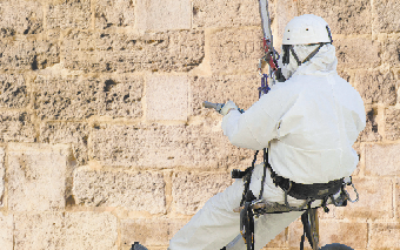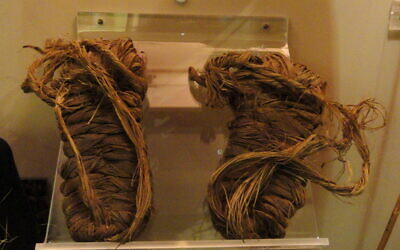The 5781 Purim Gazette
Our annual Purim spiel from professor Essie Fresser offers news on the latest burping remedy, alternative vehicles for hire, and sticky archeological discovery.

Welcome to our annual Purim Gazette, edited by award-winning journalist and all-round swell gal, professor Essie Fresser.
Dr. Fresser, an avid shuffleboard competitor and tango enthusiast, is also the co-host of a Jewish cooking show, “Fressin’ with Essie.”
Icy Sensation Grepsicle At Last
 How many times have you or someone you love moaned, “Oy, if I could only stop burping!” Sufferers from this embarrassing gastric malady can now find relief with a frosty treat-on-a-stick. The tasty antidote is the lastest edible invention by Hy Dare, a member of a large dyspeptic family. He was at his wit’s end trying to help his beloved paternal Bubbie, who couldn’t stop “grepsing,” after the weekly Ashkenazic Shabbat meals for which she was famous. The Grepsicle was successful in relieving the discomfort of Bubbie Dare and many other bilious kin, who urged their rescuer to get Grepsicle into commercial production.
How many times have you or someone you love moaned, “Oy, if I could only stop burping!” Sufferers from this embarrassing gastric malady can now find relief with a frosty treat-on-a-stick. The tasty antidote is the lastest edible invention by Hy Dare, a member of a large dyspeptic family. He was at his wit’s end trying to help his beloved paternal Bubbie, who couldn’t stop “grepsing,” after the weekly Ashkenazic Shabbat meals for which she was famous. The Grepsicle was successful in relieving the discomfort of Bubbie Dare and many other bilious kin, who urged their rescuer to get Grepsicle into commercial production.
Dare’s icy anodyne will soon appear at convenient sites in Atlanta. Two Grepsicle kiosks are slated for food courts at Lenox and Perimeter malls, and a freestanding upscale Grepsicle shop is coming to the Avalon community. Additionally, a Grepsicle food truck will stop at enrolled congregations following Mens’ Club breakfasts.
Dare has a background in frozen cures for other common conditions, notably the popular Zitsicle and Baldsicle. When asked about Grepsicle ingredients, Dare snappily responded, “You’re not the first person who tried to steal my ideas, and I’m not giving out samples.” Dare was equally secretive about the Zitsicle and Baldsicle, his company’s biggest sellers. Zitsicle vending machines are on back-order during the pandemic, but are slated to be installed in movie theaters and high school cafeterias nationwide.
Rickshaws Come to Atlanta
 Spoke-and-wheel dealer and spin class aficionado O.K. Bymey represented Atlanta Jewry when he participated in the 2010 Tour de France by wearing a Camp Barney Medintz jersey and vintage crocheted Coca-Cola Tab kippah throughout the race. A cycling enthusiast, Bymey purchased several classic rickshaws on eBay when his teenage children repeatedly failed their driving tests. The Bymeys’ three-wheeled open-air vehicles were so popular with teens and adults alike during the pandemic that Bymey approached Mayor Kiester Bottoms with a novel idea. Using his cycling expertise, Bymey offered to train unemployed individuals with hefty leg muscles to master rickshaw driving and expand Atlanta’s hire-to-ride options.
Spoke-and-wheel dealer and spin class aficionado O.K. Bymey represented Atlanta Jewry when he participated in the 2010 Tour de France by wearing a Camp Barney Medintz jersey and vintage crocheted Coca-Cola Tab kippah throughout the race. A cycling enthusiast, Bymey purchased several classic rickshaws on eBay when his teenage children repeatedly failed their driving tests. The Bymeys’ three-wheeled open-air vehicles were so popular with teens and adults alike during the pandemic that Bymey approached Mayor Kiester Bottoms with a novel idea. Using his cycling expertise, Bymey offered to train unemployed individuals with hefty leg muscles to master rickshaw driving and expand Atlanta’s hire-to-ride options.
The far-thinking mayor, after taking a spin in one of the rickshaws, loved the virally resistant fresh air ride and calculated the long-term benefit of a rickshaw corps on the city’s environment. In a secretly taped discussion with deputy mayor Clay Feete, Bottoms grumbled, “Let’s see if those clean-air fanatics who dumped scooters all over the place will transition to become rickshaw riders. I’ve had it with those kvetchers.”
The City of Atlanta authorized Bymey to purchase a dozen rickshaws from Indonesia and start on-site training of quick-witted operators on I-285 between 4:00 and 6:00 pm. Bymie expressed his delight, “I’m proud that my children’s poor driving scores will help global warming.”
Researchers Collaborate on ‘Thinq Tanq’
 Neurology researcher Pauline Pippick and master plumber Brad Matrix met as students on a Birthright Israel trip five years ago. As their relationship deepened, they considered collaborative projects, and Pippick secured a joint National Institutes of Health grant to develop the Thinq Tanq. The first Atlanta model, for participants in an anxiety study, has been installed in an undisclosed secluded location. The Thinq Tanq consists of an enormous, sanitized steamship water heater in which users may sit in silence to cogitate. External interference is offset by a white noise machine or banal Yanni recording. The goal of the Thinq Tanq is to provide sanctuary to individuals who are desperate for isolation. This underserved and growing group has suffered greatly during the pandemic, enduring involuntary interaction with gregarious family members.
Neurology researcher Pauline Pippick and master plumber Brad Matrix met as students on a Birthright Israel trip five years ago. As their relationship deepened, they considered collaborative projects, and Pippick secured a joint National Institutes of Health grant to develop the Thinq Tanq. The first Atlanta model, for participants in an anxiety study, has been installed in an undisclosed secluded location. The Thinq Tanq consists of an enormous, sanitized steamship water heater in which users may sit in silence to cogitate. External interference is offset by a white noise machine or banal Yanni recording. The goal of the Thinq Tanq is to provide sanctuary to individuals who are desperate for isolation. This underserved and growing group has suffered greatly during the pandemic, enduring involuntary interaction with gregarious family members.
In a terse phone interview, Thinq Tanq subject Flo Freely explained, “How would you feel if your family played Twenty Questions and Twister all day long? Dr. Pippik and Mr. Matrix are my heroes.”
Disturbance at the Kotel
 Riots broke out when workers cordoned off the Kotel area in the Old City of Jerusalem before daybreak last week, preparing to pressure-wash the Western Wall. For decades folded paper entreaties stuffed in the wall’s crevices have been surreptitiously removed from the Kotel, reportedly to preserve the stability of the ancient stones. Now the Israel Ministry of Tourism, fearing adverse economic impact of further deterioration of the major Holy Land attraction, boldly ordered the overall cleansing. The Ministry cited evidence that salt from human tears and stains from hands that recently held shwarma wraps are deleterious to the limestone structure.
Riots broke out when workers cordoned off the Kotel area in the Old City of Jerusalem before daybreak last week, preparing to pressure-wash the Western Wall. For decades folded paper entreaties stuffed in the wall’s crevices have been surreptitiously removed from the Kotel, reportedly to preserve the stability of the ancient stones. Now the Israel Ministry of Tourism, fearing adverse economic impact of further deterioration of the major Holy Land attraction, boldly ordered the overall cleansing. The Ministry cited evidence that salt from human tears and stains from hands that recently held shwarma wraps are deleterious to the limestone structure.
Word leaked out about the planned cleansing, and at the crack of dawn, Orthodox Jews and Evangelical Christians got there first to form a human chain barring the workers from modifying the holy site. Their strategic Kotel protection effort was bolstered by verbal support from red-string sellers, whose daily livelihood is directly linked to a steady supply of superstitious Kotel visitors. Soon, groups of Yeshiva students raced from their breakfast tables and pelted the pressure washers with hard boiled eggs and sardines.
Within minutes, crew manager Ahmad bin Jamal and his workers grabbed their equipment and ran, dodging bags of Krembo and Bissli the Evangelicals hurled at them from well-stocked bible tote bags.
On the evening news, outgoing Knesset member Tsippi Sodeh was sanguine about the incident. “Coalition governments are used to balancing religion and economics. We acknowledge the sanctity of the Kotel and just wanted to spiff it up a bit. Let the next government worry about it.” She was quick to add, “The Pressure Washers Union has been assured that workers will receive a full day’s pay and lunch money, and all eggshells and food wrappers will be removed from damaged equipment.”
Counting the Omers
 Israel’s Ministry of Religion, in response to the never-ending hostility and frequent conflicts among religious groups, came up with a plan intended to promote amity among the factions. The ministry proposed a public observance of the Omer period, the seven weeks during which each day between Passover and Shavuoth is scrupulously counted. This year, in an unprecedented show of unity, the chief Ashkenaki and Sephardi rabbinate agreed: all Israelis with the name of Omer will be invited to post a photo on a special social media site, and the number of participants will be tallied. At the time, the counting of the Omers seemed to be a good way to educate and include more Israelis in the religious practice.
Israel’s Ministry of Religion, in response to the never-ending hostility and frequent conflicts among religious groups, came up with a plan intended to promote amity among the factions. The ministry proposed a public observance of the Omer period, the seven weeks during which each day between Passover and Shavuoth is scrupulously counted. This year, in an unprecedented show of unity, the chief Ashkenaki and Sephardi rabbinate agreed: all Israelis with the name of Omer will be invited to post a photo on a special social media site, and the number of participants will be tallied. At the time, the counting of the Omers seemed to be a good way to educate and include more Israelis in the religious practice.
When the call for photos came out, a group of Israelis with names similar to Omer demanded inclusion. The dissonance was led by popular journalist Amir Tsarfati and classics professor Homer Ratz. A group of librarians demanded a posthumous inclusion of the Muslim philosopher and poet Omar Khayyam, and selfies arrived from the Emirs of Qatar and Kuwait. A menacing unsigned letter from Sicily warned that a possible misapplication of the omerta code will have dire consequences.
Will the counting of the Omers proceed as planned? The conflict has reached the chambers of Israel’s Supreme Court, with time running out for a ruling.
World’s Oldest Gum Found on Ancient Sandal
 A group of archaeology students, excavating in the Sinai Desert with professor Ben Dover of the Jerusalem Archeological Museum, unearthed a cache of tattered leather items, likely dating from the 13th century B.C.E. Among the artifacts was the sole of a sandal, possibly discarded during the exodus from Egypt.
A group of archaeology students, excavating in the Sinai Desert with professor Ben Dover of the Jerusalem Archeological Museum, unearthed a cache of tattered leather items, likely dating from the 13th century B.C.E. Among the artifacts was the sole of a sandal, possibly discarded during the exodus from Egypt.
This amazing discovery answered a question that has confounded scholars for centuries: Did the Jewish people have snacks, anxiety reducers or palate cleansers during their 40 years of nomadic life? The small, wadded substance, resembling dried Silly Putty, adhering to the sandal sole, may answer that timeless conundrum. The discovery led to gossip in archeological circles that certain unclassified wadded relics stuck under ancient desks may finally have been identified.
A number of experts from the Cairo Museum and the Rockefeller Archeological Museum were invited to weigh in on the discovery, and they came to a consensus opinion. Speaking for the multi-national group, Ben Dover had this to say, “We have no choice but to assume that ancient Hebrews chewed gum. Whether this was a substance carried out of Egypt or part of the daily manna remains unclear.”
Pandemic Jewish Studies
 Brothers Sam and Solly Schvitzbud from the Leibedick Kollel in Mississippi heard that Atlanta, usually a citadel of dynamic Jewish learning, has seen classes become tedious and mind-numbing during the shift from live to virtual. To that end, they sent the following suggestions to their Melton-teacher cousin Leah Nagelvasser:
Brothers Sam and Solly Schvitzbud from the Leibedick Kollel in Mississippi heard that Atlanta, usually a citadel of dynamic Jewish learning, has seen classes become tedious and mind-numbing during the shift from live to virtual. To that end, they sent the following suggestions to their Melton-teacher cousin Leah Nagelvasser:
- Purge to a Psalm: Get rid of all the junk in your basement while listening to King David’s poetry.
- Waiting One-on-One: Bring your study partner with you as you sit in your car before your vaccination.
- Balloon Bible: Soar with your pod in a hot-air balloon while reviewing the weekly Torah portion.
- Rake with Rashi: Enhance your lawn maintenance time by contemplating commentary by the medieval scholar.
- Cook and Conjugate: Practice Hebrew verbs while preparing Shabbat meals.
- Wash and Dry Deliberation: Ponder hamantashen fillings while doing laundry.




comments